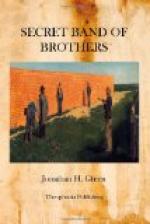Mr. Freeman resumed, and again contended for the right of any man to gamble—that he had a right to do what he would with his own—and that a law was unfair which punished this one vice, and let other and greater vices alone. It was cowardly legislation. A gambler was said to have no home, and would not be missed, if he were sent to prison; but send a man of property, of standing to prison for some one of his vices, and there would soon be a fuss in the wigwam. Mr. F. was very severe upon the great body of editors, for following servilely public opinion, without courage or independence to express a manly opinion of their own.
Mr. F. said that all ministers were not good men—there were a few exceptions—neither should all gamblers, in fairness, be considered as scoundrels. He, Mr. F. as a gambler, never would admit his inferiority to those individuals who, without labour, gained money and circumvented others by extensive and fraudulent schemes of speculation.
The Rev. John Chambers summed up with great eloquence and ability, and said that he was disappointed—he had expected a defence and vindication of gambling as an honourable profession—but he was glad to find that the gentleman who had spoken, Mr. Freeman, had not even attempted to advocate gambling as truthful or honest.
Mr. Chambers considered all dealing fair, in which a man received a quid pro quo—but whether a man cheat at cards or in the sale of a bale of dry goods, he was equally a scoundrel. If Mr. Freeman would make it appear that gambling was a fair business, he (Mr. C.) would not wish it to be a Penitentiary offence; but if gambling was, as Mr. Green had shown, a system of robbery—why then, it ought to be a Penitentiary offence. Mr. C. said that Mr. Freeman had behaved honourably—for he had said to young men—“Do not come into this place!” And why? Because it was the road to ruin.
Mr. C. regretted that Mr. Freeman should have made several scriptural allusions. No virtuous man would ever support gambling—for it gave no equivalent either in money or reputation for the losses sustained. As such was the case, gambling should be a Penitentiary offence—but if Mr. Freeman could prove that it was an upright and honourable calling, why then, perhaps, he might induce us to apprentice our children to it.
After Mr. Green had spoken for a few minutes, the debate was adjourned to Thursday evening next.
From the Evening Bulletin.
The great discussion on the subject of gambling came off last night at the Chinese Museum, between Mr. Green, the celebrated Reformed Gambler, and Mr. Freeman, the individual who acknowledges himself one of the “sporting” band. The audience was very large and respectable. A board of worthy gentlemen were appointed a governing committee, of which Dr. Elder acted as chairman. The whole proceedings were marked with the greatest decorum.
Mr. Freeman spoke first. He is a man somewhat advanced in years, and possesses abilities, which we could wish were better applied than in the defence, or even palliation, of such a corrupting habit as gambling. He directed his batteries mainly against the late gambling laws in this state.




